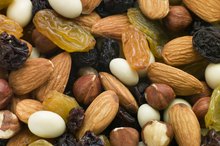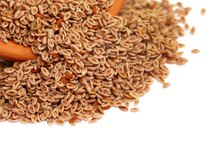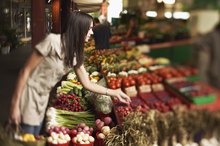Ulcerative Proctitis Diet
Ulcerative proctitis results in inflammation of the rectum; it is a milder form of ulcerative colitis, which involves both the rectum and the large intestine. An improper immune system response leads the body to mistakenly attack the intestines and substances that pass through it, leading to chronic inflammation. While diet often serves as a complement to many conditions, it takes center stage in managing inflammatory bowel disorders like ulcerative proctitis. Although no cure exists, a combination of medications and lifestyle changes like diet can help bring about long-term remissions and reduce symptoms.
Role of Nutrition
Good nutrition is important on many fronts when it comes to ulcerative proctitis. A diet rich in a variety of vitamins, minerals and other substances promotes healing processes and counteracts the nutrient loss that can occur with this condition. Additionally, watching the types of foods you eat during an active flare-up can reduce the severity of symptoms. No official proctitis diet exists explains the Crohn’s and Colitis Foundation of America,, and while some blanket suggestions might apply across the board, you should carefully monitor your diet to identify personal triggers.
Considerations for Fiber
How to Eat With Diabetes and Crohn's Disease
Learn More
While fiber has been linked to reducing the risk of many bowel problems, it can prove problematic during active flare-ups of ulcerative proctitis, notes the University of Maryland Medical Center, or UMMC. Eating too much fiber can increase bloating, gas and frequency of bowel movements. You need to experiment with fiber in your diet to determine your own personal tolerance level. Slowly increase the amount of fiber in your diet. Try steaming or baking high-fiber vegetables rather than eating them raw.
Reducing Inflammation
While the inflammatory processes that contribute to ulcerative proctitis have a complex web of causes, eating a diet that eases inflammation can serve as a valuable tool in your treatment arsenal. Eat lots of antioxidant-rich foods as antioxidants fight inflammation. The best choices include a wide range of fruits and vegetables across the color spectrum. Refined white flour foods and sugary foods can also trigger inflammation. Eat anti-inflammatory fats found in healthy cooking oils like canola and olive, nuts and seeds as well as omega-3 fatty acids found in fatty fish, walnuts and flax seed.
Reducing Diarrhea, Bloating and Gas
Do Some Foods Aggravate Diverticulitis?
Learn More
Certain foods can worsen symptoms of your condition and aggravate your rectum. Mayoclinic.com recommends limiting dairy intake to reduce diarrhea. In some cases, you might need to eliminate it completely. You should work with a dietitian to ensure adequate calcium intake from other sources.
Foods that contribute to gas and bloating include cruciferous vegetables like broccoli and cabbage, beans, popcorn, fatty and greasy foods and raw fruit juice. Alcohol and caffeine stimulate the intestines, which can worsen diarrhea, while carbonated drinks can cause gas.
Supplementation
Because of the limits of your diet, you might not get all the nutrients you need in the required amounts. Ulcerative proctitis increases your risk of certain deficiencies including iron, calcium, vitamin D, potassium and magnesium. Talk to your doctor about possible supplementation; do not start taking supplements on your own as excess levels could cause serious problems. Supplementing with probiotics—the friendly bacteria that promote intestinal health might also help.
Related Articles
References
Writer Bio
Kelli Cooper has been a writer since 2009, specializing in health and fitness. She holds a Bachelor of Arts in political science from Rutgers University and is a certified personal trainer with the American Council on Exercise.








